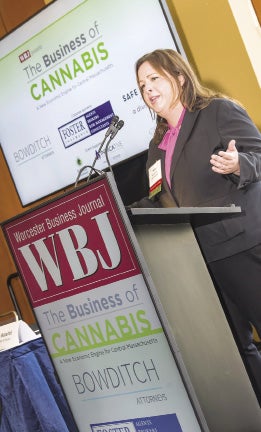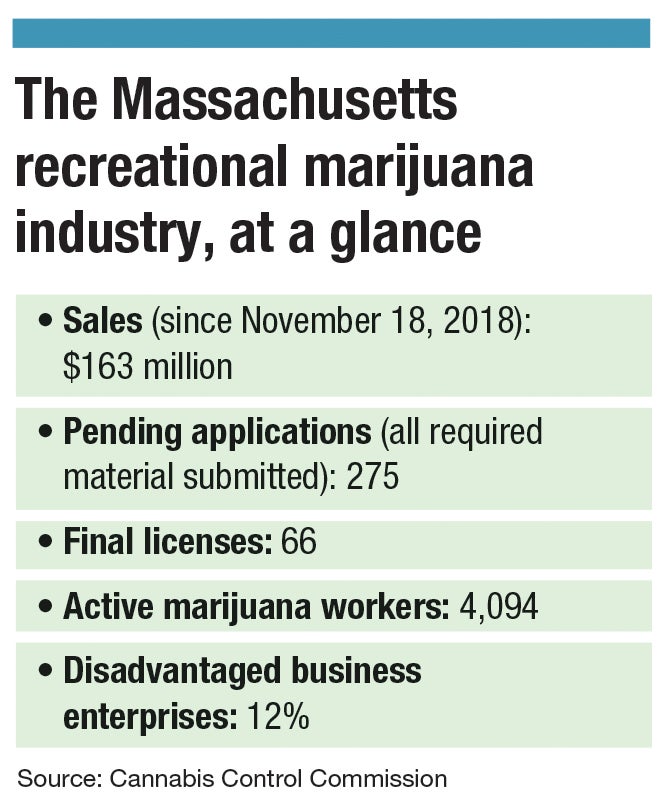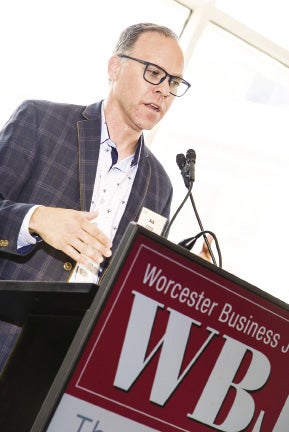
According to marijuana regulators, executives and advocates, Worcester County is quickly becoming the cannabis capital of Massachusetts, despite the state struggling with a painfully slow rollout and laws possibly needing to be changed.
“We’re building a rocketship as we’re in orbit,” said Beth Waterfall, executive director of Elevate Northeast, a New England marijuana advocacy organization, at Worcester Business Journal’s Business of Cannabis event on June 11 at the DCU Center in Worcester.
According to the Massachusetts Cannabis Control Commission, Worcester County continues to lead the way with marijuana business applications. As of June 7, the county had 110 completed applications. The nest closest was Berkshire County with 43.
A very deliberate pace
Despite the undeniable energy and enthusiasm for the fledgling industry providing jobs and tax revenue, evidenced by $163 million in sales between 19 stores since November, almost every aspect of the cannabis industry’s rollout in Massachusetts is behind other recreational states, while supply and demand are keeping prices prohibitively high.
In states with established adult-use markets, Massachusetts is behind nearly every other state in per capita sales through the first six months of that state’s legal industry with about $18. Nevada leads the way with $64.
That state, unlike Massachusetts, simply allowed medical marijuana operators in good standing to enter into the adult-use market on July 1, 2017, less than seven months after that state voted to legalize the use and sale of cannabis products.

“We hadn’t even passed a law to amend the law that voters passed the previous November,” said Kris Krane, co-founder and president of 4Front Ventures, a multi-state cannabis operator doing business in Massachusetts — with cultivation and retail operations in Worcester — as Mission Massachusetts.
The cannabis industry in Massachusetts, Krane said, has been typified by slow rollouts, beginning in 2013 with the first medical marijuana application process after voters approved a ballot question in 2012.

Within two years, only a handful of those stores had opened, and 47 existed in Massachusetts when two recreational dispensaries were allowed to open last November.
With 19 adult-use stores open and hundreds more in the pipeline, prices are exorbitantly high, with an eighth ounce of marijuana in Massachusetts typically selling for at least $50, not including sales tax.
In other adult-use states like Washington, prices rarely get above $40 for an eighth, but that’s typically very high quality bud. In fact, some whole ounces can go for even less than that, Krane said.
Achieving diversity, changing laws
Krane stopped short of blaming just one person, agency or group for the slow rollout and actually commended the Massachusetts Cannabis Control Commission for its forward-thinking regulatory structure, which includes opportunities for microbusinesses, craft cooperatives and social equity programs to right the past wrongs of the War on Drugs.
“For licensing structure alone, I think Massachusetts probably has the best of any adult-use state in the country,” he said.
The first two stores in Massachusetts were allowed to open on the same Tuesday in November. One of those stores, Cultivate, is in Leicester just off of Route 9.
That could have been planned better, joked Kay Doyle, a Cannabis Control Commission member.
“If you’re going to do this … don’t hand out the first license on the only road that accesses the local Walmart on the same week as Black Friday,” Doyle said.
For a few weeks, the small town struggled to keep up with the increased traffic and long lines outside of the dispensary located in a residential area.
According to Doyle, a regulatory expert who spent time with the state Department of Public Health and worked as primary counsel for the medical marijuana program, the adult-use program was meant to be a safe, equitable, innovative and environmentally friendly industry.
“That all adds up to sustainable opportunity,” she said. “We have to plan to make sure we don’t get in the way of business and do it in a way that allows it to grow in a way that still serves those fundamental principles.”
The state has lofty diversity goals, but the industry so far is dominated by white men. According to the CCC’s own data, 73.6% of the state’s marijuana workforce is white and 67% are men.
Of businesses with either provisional or final approval from the CCC, 12% are owned by someone who identifies as either a minority, woman, veteran, or a member of the LGBTQ community.

Startup costs for the cannabis industry can be prohibitive unless a firm has connections to deep-pocketed investors, but the CCC is hoping to open up the industry to a wide variety of business owners with social consumption and delivery businesses soon to come.
Per state law, municipalities not wanting cannabis businesses in town can vote to ban the industry, but cities and towns have to do the opposite to allow social consumption businesses in.
Doyle defended the CCC’s strict regulators around security, which can prove costly, but conceded some laws or regulations, like the social consumption part, will need to be tweaked as the industry grows into itself.
“We do need to fix that so people can get this going,” she said.
